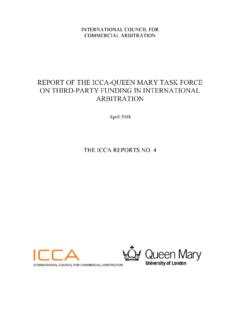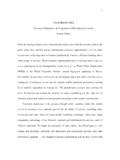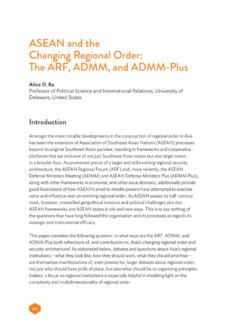Transcription of DRAFT CYBERSECURITY PROTOCOL FOR …
1 DRAFT CYBERSECURITY PROTOCOL FOR INTERNATIONAL ARBITRATION CONSULTATION DRAFT 1 Announcement of CYBERSECURITY PROTOCOL Consultation International arbitration in the digital landscape warrants consideration of what constitutes reasonable CYBERSECURITY measures to protect the information exchanged during the process. Recognizing this need, the International Council for Commercial Arbitration (ICCA), the International Institute for Conflict Prevention and Resolution (CPR) and the New York City Bar Association have established a Working Group on CYBERSECURITY in Arbitration (the Working Group ).
2 The Working Group has promulgated a DRAFT CYBERSECURITY PROTOCOL for International Arbitration (the PROTOCOL ) and is now pleased to proffer this DRAFT PROTOCOL for public consultation. The DRAFT PROTOCOL is attached hereto. The consultative period will last until 31 December 2018. All interested parties are encouraged to provide detailed thoughts and comments on the DRAFT PROTOCOL , or to provide general feedback. The Working Group will hold a number of public workshops in different parts of the world to solicit and discuss the views of interested parties. In addition, the Working Group welcomes written comments from interested parties which should be submitted no later than 30 September 2018, through the Working Group s page on ICCA s website at < >.
3 In anticipation of the public consultation, which the Working Group anticipates will include input from a variety of sources with differing views, the DRAFT PROTOCOL refrains in Schedule A from offering specific CYBERSECURITY measures for possible inclusion in arbitration agreements or procedural orders. Instead the PROTOCOL suggests a procedural framework for developing specific CYBERSECURITY measures within the context of individual cases, recognizing that what constitutes reasonable CYBERSECURITY measures will vary from case-to-case based on a multitude of factors. Depending on the feedback received, the final PROTOCOL may or may not include such proposed measures in Schedule A.
4 Following the consultation period, the PROTOCOL will be revised, refined, and finalized in accordance with the input and comments received. After that time, the Working Group anticipates that there will be an ongoing review and revision process, as CYBERSECURITY issues will evolve with changing technology, new cyberthreats, changing laws and regulatory schemes, and emerging consensus as to best practices. The Working Group is chaired by Brandon Malone (Chairman of the Scottish Arbitration Centre and the principal of Brandon Malone & Company). Its members include Olivier Andr (CPR), Paul Cohen (4-5 Gray s Inn Square Chambers), Stephanie Cohen (independent arbitrator), Hagit Elul (Hughes Hubbard & Reed), Lea Haber Kuck (Skadden, Arps, Slate, Meagher & Flom LLP), Micaela McMurrough (Covington & Burling), Mark Morril (independent arbitrator), Kathleen Paisley (Ambos Law) and Eva Y.
5 Chan (Skadden, Arps, Slate, Meagher & Flom LLP) as Secretary to the Working Group. 3 DRAFT CYBERSECURITY PROTOCOL for International Arbitration I. Introduction: Importance of CYBERSECURITY in Arbitration A. Most exchanges of information1 today are digital, including in international arbitration and other forms of dispute resolution. B. Parties expect that the providers of dispute resolution services and other participants in the dispute resolution process will take reasonable measures to protect non-public exchanges of information, including reasonable CYBERSECURITY measures, to safeguard digital information from unauthorized access and disclosure.
6 C. CYBERSECURITY may be legally mandated when the information at issue is personal or industry-regulated data, or if the information is relevant to national security or other matters of public interest. D. In an increasingly digital landscape, the credibility of any dispute resolution system, including arbitration, depends on maintaining a reasonable degree of protection of the digital information exchanged during the process, except where the parties intend for the information to become public. Arbitration proceedings are not immune to increasingly pervasive cyberattacks against businesses, law firms, governmental actors, educational institutions and other custodians of large electronic information repositories.
7 This means that attention to CYBERSECURITY is required in international arbitration as it is in other sectors. E. Arbitration has the benefit over other dispute resolution processes of enabling parties to maintain the confidentiality of the dispute resolution process itself where they want to, and the information exchanged within it. Reasonable CYBERSECURITY measures are essential to ensure that international arbitration maintains this advantage. F. Even where an arbitration has not been made confidential by agreement of the parties or by application of arbitration rules or law, maintaining the legitimacy of the process may require that certain aspects of the arbitral process remain confidential.
8 For example, interactions between an administering institution and the parties, tribunal deliberations, and DRAFT awards are generally intended to remain private and secure. G. Although a reasonable degree of CYBERSECURITY is critical for international arbitration in the digital world, what is reasonable in any given circumstance depends on various factors discussed herein. Proposed by the Working Group on CYBERSECURITY in Arbitration established by the International Council for Commercial Arbitration (ICCA), the International Institute for Conflict Prevention and Resolution (CPR) and the New York City Bar Association.
9 Pending a period of public consultation, the PROTOCOL is being issued as a DRAFT for debate and comment. The Working Group anticipates that a final version of the PROTOCOL will be released in 2019. 1. This PROTOCOL uses the broad term information to include all types of electronic and non-electronic information of any type and in any form, including both commercial and personal information. When referring to personal information specifically, we use the term personal data employed in many data protection laws and regulations. This is also a very broad term and typically includes all information of any nature whatsoever that individually or collectively could be used to identify an individual (including for example, work-related emails, lab notebooks, agreements, handwritten notes, etc.)
10 DRAFT CYBERSECURITY PROTOCOL FOR INTERNATIONAL ARBITRATION 4 H. CYBERSECURITY is a shared responsibility of all Participants2 in the international arbitration process. Security of information ultimately depends on the responsible conduct and vigilance of individuals. Many breaches arise from individual conduct; any individual actor can be the weak link , no matter how robust the security of its infrastructure. I. The Participants in international arbitrations are, to a large degree, digitally interdependent, because the process typically involves the transmission and hosting of information and collaborative elements such as communications relating to the arbitration.









